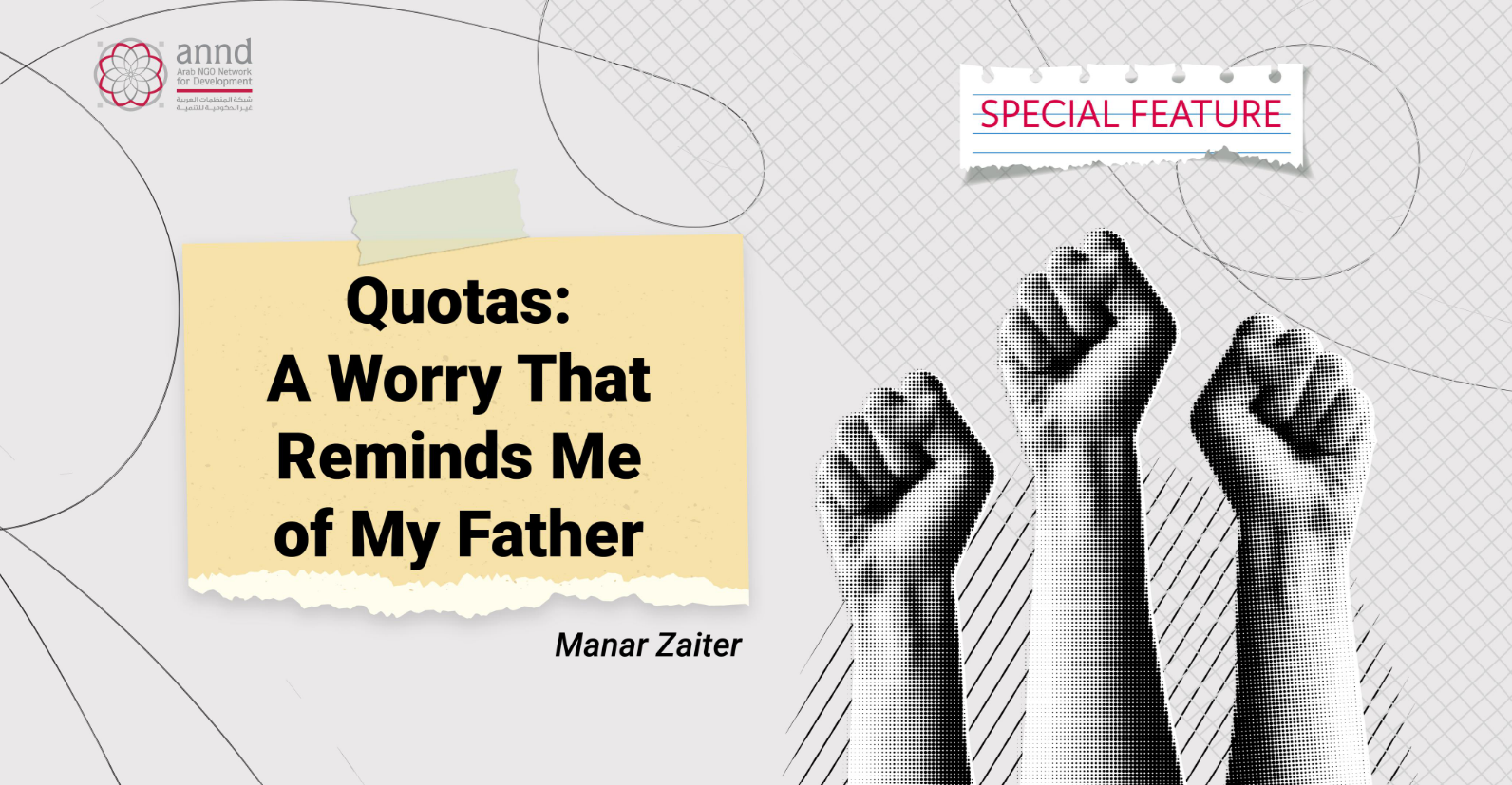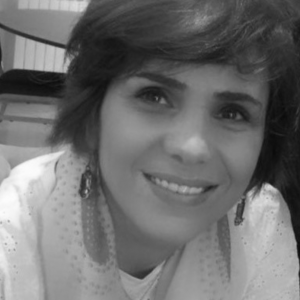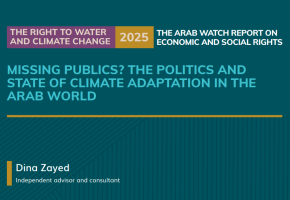Quotas: A Worry That Reminds Me of My Father – Manar Zaiter
The year 2025 took me back to 2006, not because it was the heaviest and most challenging year due to the loss of my father. The year always reminded me of an experience that became part of the formation of my feminist and human rights awareness.
In 2006, as is customary among families and clans across Lebanon, particularly in the Bekaa, it was necessary to organize the fortieth day commemoration of my father's death. The 2-year-old me decided to deliver the family eulogy at the memorial service. However, disagreement arose among my cousins due to a "girl's" audacity to suggest something unusual that contradicts all norms and traditions. They ultimately decided to seek the opinion of a religious scholar on the matter. Nevertheless, I was allowed to do what I wanted for several reasons. I did not care about all this disagreement at the time, its causes, or its repercussions, despite my love for all my cousins. Simply put, all I could think about was saying to my father what I couldn't tell him in the intensive care unit, just hours before his death.
I don't know why the past months of 2025 brought me back to that experience as I watched and interacted with the recent municipal elections in Lebanon. I genuinely don't know the connection between this distant incident and the issue of women's political participation in these elections, which offered little new ground, whether in terms of the percentages and levels of women's participation, despite a slight advance, preceded by progress in the last parliamentary elections, or in terms of the factors and reasons that continue to exclude women from the public sphere.
The discourse of recent years strikes me as unusual and worrisome, given its role in shaping relevant issues and framing their content.
The context of women's political participation in the past has been conceptualized as "women demanding seats at the table where public policy is discussed." Given the slow increase in the number of women in politics, the quota system has been considered a primary mechanism for achieving gender balance in political institutions. While true, the discussion of gender-balanced political processes could have benefited from going beyond mere numbers or the mere inclusion of women in parliament or municipalities. The assumption that formal or digital participation in state institutions automatically leads to the representation of women's interests and the deepening of democracy has proven false. As a result, quotas have failed to address the factors responsible for the tangible closure of the public sphere to women in several countries, let alone in a country like Lebanon.
The Lebanese context reveals a superstructure that limits women's opportunities and aspirations in politics. This structure pays no attention to women's individual experiences, does not take into account their familial and social burdens, and lacks mechanisms that facilitate their reconciliation of their various roles if they wish to advance politically. This system is based on the pillars of political, familial, and sectarian clientelism. It reproduces itself through women, as many adopt the current model and see it as the only possible means of engagement and participation, particularly when it provides them with some form of protection. The entrenchment of this patriarchal system, whose norms keep women in a subordinate position, becomes evident.
Unfortunately, this structure cannot be dismantled simply by adopting a quota system. In this country, the presence of women at the table does not necessarily mean effective representation and participation that contributes to gender equality or influences a significant number of women. Fully addressing the complexities of gender inequality in politics requires more than the mere presence of female politicians; it necessitates a comprehensive approach that encompasses the full range of issues. It requires combining visible presence with influence, which calls for a shift from purely formal representation to substantive presence. This shift is more sustainable and can make decision-making spaces more democratic, inclusive, and equitable. Only with substantive representation can women's political participation change the meaning of politics and the way it is conducted, making it a vehicle for real issues.
The current discourse has rightly focused on numerical representation. However, it has not been coupled with the demand to transform political processes to be more inclusive, responsive, and representative of women's diverse interests and voices. This discussion of women's quotas brings us back to the Lebanese quota system, whereby each sect receives a quota, with representation monopolized by a dominant political force that controls the sect's decisions. Thus, the sect is represented, but its members are only represented by that dominant force.
Will the women's quota system reproduce the exact mechanism within the quota mentality, or should we move to other formulas that liberate society from all forms of domination, including male hegemony?
The current discourse is based on the assumptions and rules of the liberal feminist game. This game focuses on individual empowerment and legal rights, but it does not address deep-seated systemic inequalities. It shifts responsibility to women without changing unequal structures, and without acknowledging that the pillars of the patriarchal political, economic, social, and cultural system are the root cause of women's oppression. It does not seek to dismantle them, either. Within this game, individuals are viewed as entrepreneurial agents personally responsible for their individual advancement, regardless of the circumstances and barriers they face.
Emphasis on self-responsibility celebrates selective and glamorous feminist ideas such as women's empowerment, choice, and autonomy. It attempts to promote a euphoric narrative of self-determination and self-sufficiency. This narrative overlooks reality and promotes a perception that women can "do it all" if they just put in a little more effort.
On the surface, these messages appear encouraging for women, but a closer analysis reveals something quite different. By addressing women as entrepreneurial actors, and through attractive messages such as "Show your capabilities" and "Break the shackles," there is a false assumption of a level playing field and an overlooking of the structural frameworks that exclude women and marginalize those less fortunate under the pretext of being "less daring."
These tools are not limited to the field of political participation. They are also strongly present in everything related to women's economic participation, by reducing the term "empowerment" to organizing training courses, providing soft loans, or cash assistance. These tools remain within the realm of problematic approaches and do not address the structural imbalances that deepen these gaps.
This discourse serves to reinforce the traditional separation between the private and public spheres. Every election presents an opportunity to reaffirm that issues of domestic violence, reproductive rights, unpaid labor, social protection, access to education and healthcare, and other concerns are inherently political and must be addressed within the broader political framework. These issues have been absent from the conversation about political participation. By focusing on these issues, we could have expanded the scope of political analysis and found comprehensive solutions to gender inequality.
Yes, I am concerned about the current public discourse, which contributes to distorting the discussion around women's issues and threatens the feminist agenda as an agenda for democracy, citizenship, and social justice, and as an agenda for all women, not just for middle-class feminists. It recognizes the participation of women who actually build society, maintain its resilience, and actively contribute to various societal structures to keep it alive. These women exist in all public spaces, not according to our one-sided classification. The agenda must mobilize at the grassroots level, starting with the people and for the people. It must not look down on them, but use tools and language that are close to them to resist all mechanisms of superiority and authority.
I realize that diversity is rich, and that the movement has never been a monolithic fabric, but we need to reflect on many questions.
How do women, all women, determine mechanisms to confront exclusionary structures, without elites monopolizing their issues? How can we recreate a discourse on women's participation that emerges from the heart of daily experience and from the pain of women who are not concerned with the agendas of international organizations and institutions?
How do we restore a feminism that works from the bottom up, that speaks with women, not about them, that moves away from presenting stereotypical narratives of empowerment in ready-made molds that reflect the reality of the marginalized and exhausted majority of women, and that argues that what we need is not only to demand seats, but also to reshape the table itself?
What are the working tools that help us present a different vision of political participation, one based on livelihood, economic, and security demands that impact women's daily lives and liberate the discourse from its centrality?
How do we re-establish the meaning of intersectionality as an approach that helps us understand all relations of power and oppression toward women, not just those "like us"?
How can we revive the political and activist dimensions of the concept of "empowerment" by critically examining our issues, understanding their components, and highlighting their interconnections? We must stop counting the number of women who have reached decision-making positions, listen to the experiences of women in difficult situations, analyze the narratives we encounter, and learn from them. This will help us produce a discourse that is not horizontal, not fragmented, not disintegrated, and unafraid of itself and its identity?
How do we move away from adopting a momentary discourse characterized by contempt for the past and anxiety about the future, in what resembles the phase of uncertainty we are experiencing?
How can we restore the political and activist dimension of the concept of "empowerment"? And how do we move from reductionist approaches to producing a discourse that is not horizontal, not fragmented, but rather capable of clearly outlining its identity?
How do we reaffirm the influence of money and the economy on our political participation, if we do not reaffirm the dominant impoverishing capitalist economic model?
Isn't it our duty to not identify with the official and partisan discourse that perpetuates dominance, rather than working to abolish it? Isn't it our duty to reaffirm that the quota is a mechanism that is not isolated from all other electoral reforms, and that personal status laws are one of the reasons for women's exclusion from the public sphere?
There are many other questions.
I am not sure why I wrote these words. Perhaps because I realize today, more than ever, that nostalgia is inseparable from politics. Yes, I am uneasy, but it is a longing that continues to seek out every opportunity to remember my father, the first feminist in my life.



